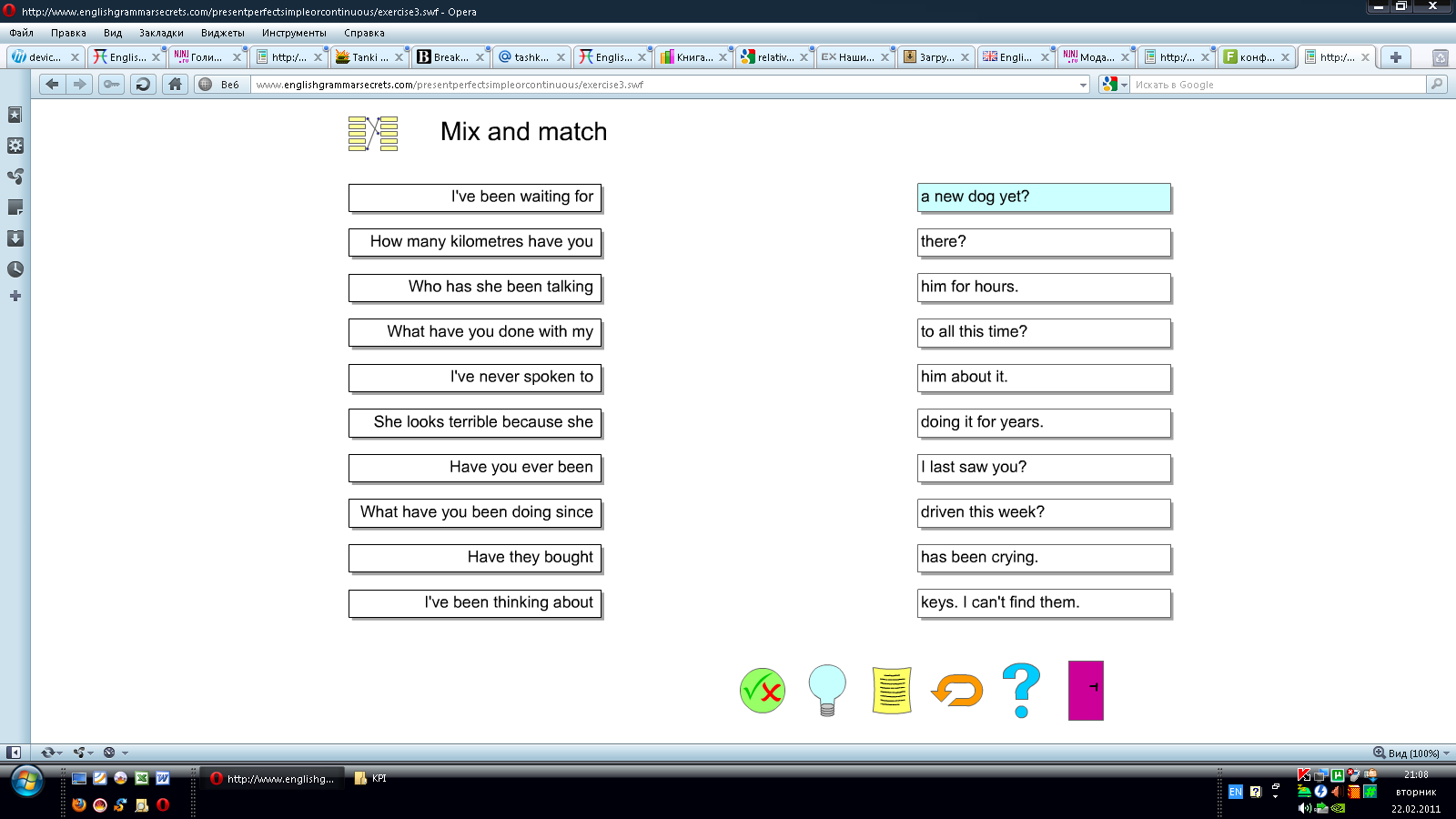
- •Grammar book 1
- •Present simple / present continuous
- •The Present Simple Tense is also used in:
- •The past simple tense
- •Exercise 4. Tick the correct sentences.
- •Past simple / past continuous
- •The present perfect tense
- •1. The Brown Family goes to Switzerland every winter. They started to do this 4 years ago.
- •Test on present perfect and past simple
- •The present perfect continuous tense
- •Exercises on the present tenses
- •Test on present tenses
- •The past perfect tense
- •Exercises on the past perfect / past simple
- •Exercise 4. Change the verb into the correct form: Past Simple, Past Perfect
- •The past perfect continuous
- •I had been dating Angelina for 3 years before we got married.
- •I had to go on a diet because I had been eating too much sugar.
- •If it hadn't been raining, we would have gone to the park.
- •Exercises on past perfect and past perfect continuous
- •1. First: It snowed all morning. Second: The kids went outside to make a snowman.
- •List of Irregular Verbs
The present perfect continuous tense
The Present Perfect Continuous is made by using the present form of the auxiliary verb "have"+past participle of the verb "to be"+-ing form of the main verb ("I have been doing"). To form questions we reverse the order of the pronoun and "have/has" (Have I, Has he ...?). This tense is rarely used in English.
Using the Present Perfect Continuous Tense: to talk about an action which began in the past and has recently finished or just finished (without time words)
Example: Bob and Gloria have just come back from the park. They have been jogging and they are very tired now.
to say how long something has been happening. The action began in the past, continues in the present (or has just stopped), and may continue into the future (with time words since, for, all day,all afternoon, every day this year, etc.)
Examples: Ann has been playing tennis for two hours. (Ann is playing tennis now. She began to play tennis two hours ago and she is still playing.)
to express an action or general activity in progress (without time words or with recently, lately) Example: Viktoria has been thinking about changing her job.


Exercises on the present tenses
Exercise 1. Open the brackets using the verbs in one of these tenses: Present Simple, Present Continuous, Present Perfect, Present Perfect Continuous.
This man (to be) a writer. He (to write) books. He (to write) books since he was a young man. He already (to write) eight books. 2. What you (to do) here since morning? 3. Lena is a very good girl. She always (to help) her mother about the house. Today she (to help) her mother since morning. They already (to wash) the floor and (to dust) the furniture. Now they (to cook) dinner together. 4. He (to run) now. He (to run) for ten minutes without any rest. 5. What they (to do) now? — They (to work) in the reading room. They (to work) there for three hours already. 6. Where he (to be) now? — He (to be) in the garden. He (to play) volleyball with his friends. They (to play) since breakfast time. 7. I (to live) in St. Petersburg. I (to live) in St. Petersburg since 1990. 8. This is the factory where my father (to work). He (to work) here for fifteen years. 9. You (to find) your notebook? — No! I still (to look) for it. I already (to look) for it for two hours, but (not yet to find) it. 10. You (to play) with a ball for three hours already. Go home and do your homework. 11. Wake up! You (to sleep) for ten hours already. 12. I (to wait) for a letter from my cousin for a month already, but (not yet to receive) it. 13. She already (to do) her homework for two hours; but she (net yet to do) half of it. 14. I (to wait) for you since two o'clock. 15. What you (to do)? — I (to read). I (to read) for two hours already. I already (to read) sixty pages. 16. It is difficult for me to speak about this opera as I (not to hear) it. 17. I just (to receive) a letter from my granny, but I (not yet to receive) any letters from my parents. 18. The weather (to be) fine today. The sun (to shine) ever since we got up. 19. Every day I (to wind) up my watch at 10 o'clock in the evening. 20. Come along, Henry, what you (to do) now? I (to wait) for you a long time. 21. Where your gloves (to be)? — I (to put) them into my pocket. 22. I (to stay) with some American friends in Chicago. I (to stay) with them for two weeks now. I (to have) a great time here. I (to take) the opportunity to improve my English. I already (to see) the towering skyscrapers of Chicago which are reflected in the rippling water of Lake Michigan. I just (to take) a picture of Chicago's Sears Tower which (to rise) 1,707 feet and (to provide) a panoramic view from the skydeck. 23. I (to go) to give that cat some food. I (to be) sure it (to starve). — But Jane already (to feed) the cat. You needn't do it.
